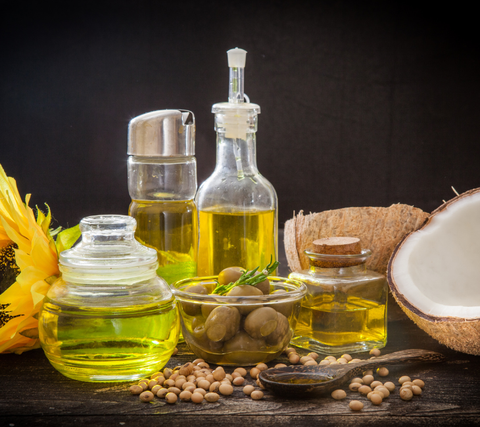How To Go Oil-Free and Why It Can Be Amazing for Your Health
While oil is a staple in most people’s cooking routine, some people choose to go oil-free or limit their oil intake.
If you’re on a low-fat diet, want to avoid oil’s high calories and saturated fat, or have a different reason for choosing to avoid oil, it can be incredibly hard to find oil-free prepared foods. Kudos to you if you can cook every meal for yourself, but sometimes you want (or need) someone else to do the heavy lifting for you.
Dr. John McDougall, M.D. designed a plant-based, heart-healthy program to help people feel great and still enjoy the food they eat. We started the Dr. McDougall’s Right Foods line over 20 years ago because we wanted to make the delicious foods from the McDougall Program accessible to everyone.
That’s why our products are oil-free, non-GMO, lower in sodium, and use organic ingredients whenever possible. Enjoy Right Foods soups and noodles knowing there’s no oil in any of our products.

What is an oil-free diet?
An oil-free diet removes any liquid oils, butter or butter-like products, and any foods that contain these items.
Many whole foods such as nuts and avocados contain high amounts of natural fats. A super strict oil-free diet would limit the intake of these foods, but most flexible low oil diets allow nuts and avocados in moderation and instead just cut out extraneous oils like cooking oils and butter.
Why do some people choose to reduce their oil intake?
Oil is high in calories and typically has very little to no nutritional benefits. Some oils are also high in saturated fat – they’re the type that raise “bad” LDL cholesterol. Lots of processed foods you find at the store contain oil, and usually the cheap, more processed ones. Restaurant food, especially, can be quite high in oil content.
It can be easy to forget or brush off the caloric content of oil if you track your calories. Even when you cook for yourself, using just one tablespoon of oil is 120 calories, which adds up quickly.
Those looking to consume a whole food, plant-based diet may choose to eliminate processed foods, including oils. While some may believe all vegan food is healthy, there are lots of processed and fried vegan foods that are full of oil.
Not all oils are the same

Different types of oils have varying types of fats, which affect LDL “bad” and HDL “good” cholesterol.
Before we jump into oils, let’s go over different types of fats. There are trans fats, which raise LDL cholesterol the most, and are generally regarded as something to stay away from in the health community. Saturated fats are up there with trans fats as an agent of high LDL and are solid at room temperature. Monounsaturated fats and polyunsaturated fats, on the other hand, reduce LDL levels and are liquid at room temperature, and are seen as a healthier option.
All of these fats have the same caloric makeup: 9 calories per gram. The way they affect the body, however, differs based on their structure.
Typically, the healthier oils commonly recommended are olive oil and avocado oil, among others. These are liquid plant-based oils that may reduce LDL cholesterol and have anti-inflammatory effects.
According to Healthline, here are 4 healthier oils:
- Olive oil
- Avocado oil
- Sesame oil
- Safflower oil
Many food products contain cheap oils like palm oil that are made up of saturated fats. That’s why reducing your processed food intake or checking the ingredients when you buy these foods is important. If you aren’t ready to go completely oil free, opt for healthier oils in smaller amounts.
Health benefits of an oil-free diet
Here are some reasons to go oil-free we’ve seen people talk about:
- Reduce caloric intake
- Reduce processed food intake
- Reduce fat intake
- Oil contains little nutritional value
- Lots of whole food sources contain necessary fats
Every body is different, so going oil-free may or may not be a good option for you. If you’re looking to make a significant health change, talk to your doctor(s).
All Right Foods products are oil-free, so you don’t need to worry about any sneaky hidden oils. Our ready-made noodles and soups make for tasty snacks or meals and only take a few minutes to prepare.
How to cook without oil

We have a whole article on Easy Tips for Cooking Without Oils, but here are a few of our most useful tips:
- Steam vegetables or saute in a liquid like water or broth
- Use an air fryer or a silicone mat in the oven for baked/fried preparations
- For baked goods, use a liquid like applesauce, yogurt, or nut butters
When buying products that aren’t whole foods, look for oil-free brands like Dr. McDougall’s Right Foods. All of our products are oil-free, so you can still enjoy easy, ready-made foods that fit your diet.
Looking for cooking inspiration? Here are 15 oil-free vegan recipes.






